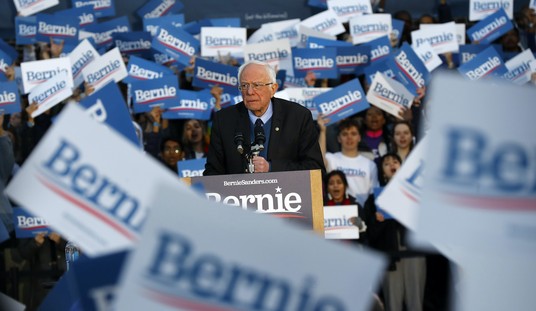Reason’s right about this as far as the argument goes, but Matt Welch also fails to note the opposite — the sanctification machine that wants to transform Edward Snowden into a martyr for liberty and justice for all. Matt collects a number of commentaries from normally liberal voices at mainstream media outlets sneering at Snowden as either a “loser” (Roger Simon at Politico), “Little Red Riding Hood” (Richard Cohen, Washington Post), “a grandiose narcissist” (Jeffrey Toobin at the New Yorker). For good measure, we also have more conservative voices such as Bush White House speechwriter Marc Thiessen dismissing Snowden as “a Paulbot,” and Fox News military analyst Ralph Peters suggesting the death penalty for Snowden on account of treason.
Matt writes that we don’t have to pre-emptively declare Snowden a saint, but only after comparing him to something just shy of a Martin Luther King:
I for one am grateful that Edward Snowden leaked, because the United States government has too free a hand to conduct surveillance and espionage (and war, and kidnapping, and extrajudicial assassination) without anything like even internal oversight. (If you think Congress is well informed on these issues, you probably haven’t talked to a civil liberties-minded congressman on a key overisght committee; and if you think FISA courts amount to effective oversight then you’re getting the government you deserve.)
And while the gold standard for civil disobedience remains publicly accepting the punishment from the government whose laws you dispute, the fact is not every act of whistleblowing or defiance is going to be conducted by a perfect replica of Martin Luther King. Would Ari Fleischer be brave enough to stand and take the heat for such an act? The question answers itself.
Meanwhile–as in King’s case–the massive machinery of American police power will be focused on making the renegade look like a maximally traitorous deviant. You do not have to pre-emptively declare Snowden a saint (indeed, we will almost certainly hear word that he is not), to be repelled by both the status quo he aims to challenge, and the enthusiasm with which Fourth Estaters enable the executive branch.
Actually, we don’t know much about who Snowden is, whether he’s acting on his own, whether he’s passed this information off to foreign intel services, or much of anything about this case — other than, of course, that he broke some very serious laws relating to his security clearance. That’s not exactly civil disobedience in the Mohandas Gandhi sense; it’s a serious crime for good reasons. Furthermore, the method chosen by Snowden to expose this program was hardly his only choice, as I’ve explained numerous times in relation to other leakers who ran to the media rather than contacting sympathetic members of Congress, a few of whom had been speaking out on NSA issues for years prior to this leak.
Until we know more about Snowden, it’s possible to be skeptical of both the NSA and the leaker:
Y'know, that I point out problems with some of Snowden's claims does not mean I believe no NSA spying occurred.
— Gabriel Malor (@gabrielmalor) June 11, 2013
It means I want more information. Which, really, I'm pretty darn surprised at how credulous everyone is being.
— Gabriel Malor (@gabrielmalor) June 11, 2013
This guy, whom you'd never heard of a week ago, tells you something completely awful, and you believe him? Why?
— Gabriel Malor (@gabrielmalor) June 11, 2013
Some people's inability to separate the two issues is ridiculous. Questioning Snowden =/= being pro big brother @gabrielmalor
— Josh in NC (@JHillVA) June 11, 2013
At National Journal, Matthew Cooper and Garance Franke-Ruta also caution on rushing to judgment in either direction, given the circumstances:
Everyone should take a deep breath. For those tempted to lionize Snowden for partially unshading totalitarian “turnkey tyranny,” as he has dubbed it, a word of caution seems in order. For those who are panicked about the revelations, some calm’s in order, too. We don’t yet have a clear sense of how the programs work — and even less of a sense of Snowden, who has taken refuge in Hong Kong with more national security secrets than Barton Gellman of the Washington Post thinks it’s wise to disclose to the public. …
Another point: Snowden not only leaked the PRISM program but also the unrelated directive outlining how the U.S. plans to launch cyberattacks, even preemptively. One can make a case that leaking PRISM was whistleblowing. But announcing plans for cyberattacks doesn’t add any insight into domestic eavesdropping. It’s understood from Tehran to Pyongyang that the U.S. plans for everything. That’s what militaries do. Releasing such plans isn’t elucidating.
Likewise, Snowden’s casual allusion to “the CIA station just up the road here in Hong Kong” is probably no great revelation to Chinese intelligence services — but it’s of no service to the cause of trying to limit or eliminate domestic surveillance. Of course the U.S. has a CIA station in Hong Kong. Why narrow down its location publicly?
Leakers are rarely pure of heart. The best known of them, Mark Felt of “Deep Throat” fame, had many motives, including how the FBI was cut out of covert operations and his own personal jealousies over being passed over by Nixon to become the bureau’s director. But Hoover’s ally did the country a service and what he said was true and changed history. In time we may feel that way about Snowden, as Ellsberg already does. Snowden backers don’t think we should trust the government. Fair enough. But why reflexively trust Snowden?
We need to investigate both the activities of the NSA and the circumstances of the exposure of these programs. It’s not that difficult to reconcile that lawbreaking of all kinds in this instance should be scrutinized. Today, I took part in a symposium at the New York Times on how to deal with Snowden, and the response was surprisingly split … and rational.
Richard Moberly, a professor of law and assistant dean at the University of Nebraska, argues that Snowden actually subverted democracy rather than defended it:
Like Pfc. Bradley Manning, Snowden ignored ways he could have objected to the program without publicly disclosing it, such as through an inspector general or to a sympathetic member of Congress. Whistle-blowers should disclose inside information about illegalities and abuse of power, but they should do it responsibly, especially when dealing with national security. Because Snowden chose the irresponsible route, the law rightly permits his prosecution.
Although we may not like the decisions that our leaders made regarding the N.S.A. program, the choice before us is whether we would rather live with their judgment or encourage unelected, unaccountable people to decide instead.
The more libertarian-minded Jonathan Adler of the Volokh Conspiracy also says that Snowden should be investigated and prosecuted, but as a background to the more serious matter of government surveillance:
Investigating and prosecuting Edward Snowden is a priority, but it should not distract from the far more important issues raised in the past week. Although some Americans may be unnerved by the details of the National Security Agency’s surveillance efforts, the more troubling revelations are that relevant members of Congress may not have been adequately briefed on the programs and that the Foreign Intelligence Surveillance Court seems willing to accept a broad and aggressive reading of the N.S.A.’s authority under the Foreign Intelligence Surveillance Act. Secrecy is necessary for national security programs, but so too is democratic accountability.
Jesselyn Radack of the Government Accountability Project says whistleblowers shouldn’t be prosecuted at all:
As happens in every whistle-blower case, the government attacks the messenger rather than listening to the message. Whistle-blowers like Snowden are invariably smeared as being deviant misfits who are out for fame, profit, revenge, or self-aggrandizement. Already, Snowden has been called a “grandiose narcissist” and traitor, and he’s been public for 72 hours.
Focusing on Snowden is a distraction from the government’s law-breaking massive domestic surveillance program. Criminally prosecuting Snowden has little to do with Snowden’s alleged crimes and everything to do with making an example of him and sending the most chilling of messages to anyone even thinking about exposing government wrongdoing, especially criminality. There is no such crime as “leaking.” Snowden may have violated a secrecy agreement, which is not a loyalty oath but a contract, and a less important one than the social contract a democracy has with its citizenry.
A war on information that targets whistle-blowers and journalists is more characteristic of a totalitarian state than a free and open democratic society.
Be sure to read it all, including my contribution at the first link.








Join the conversation as a VIP Member